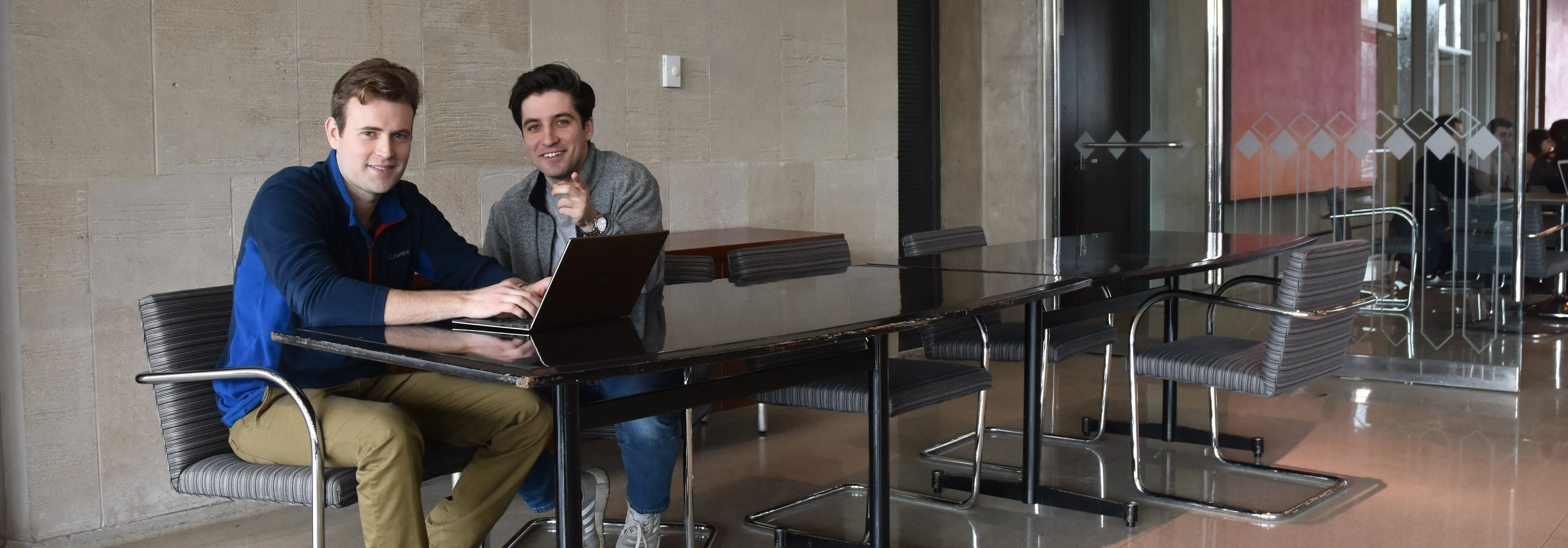Law School Entrepreneurs Soheil Ebadat and Justin Kelley Advance to Semifinals in Polsky’s New Venture Challenge

Two Law School students who cofounded a company aimed at revolutionizing private-office-space operations are at the head of a team advancing in the University of Chicago’s Edward L. Kaplan, ’71, New Venture Challenge (NVC), which is widely recognized as one of the nation’s top-ranked university accelerator programs.
Airspace, a four-person team led by Soheil Ebadat and Justin Kelley, both ’20, will be among 31 teams to move to the second phase of the NVC, a Polsky Center for Entrepreneurship and Innovation competition that helped launch startups like GrubHub, Braintree/Venmo, and Simple Mills. Ebadat, the Airspace CEO, and Kelley, the COO, are both part of the Law School’s Doctoroff Business Leadership Program, a selective program that weaves a core MBA curriculum, internships, mentorships, and enrichment opportunities into the three-year JD program.
“Soheil is a natural-born entrepreneur, and Justin brings valuable operational expertise that he gained while serving in the US Air Force,” said Robin Ross, executive director of the certificate-granting Doctoroff Program. “The two of them have been kicking around business ideas since 1L year, using the Green Lounge as their office. I get such a thrill seeing them there, building a business in between classes. It is so energizing. This is part of the vision Dan Doctoroff [’84] had when the Law School created the program [with his gift in 2013]. The Doctoroff Program has created an invaluable cohort experience that helps bring together like-minded students, acting as a catalyst for new ideas.”
The Airspace leadership team includes two other University of Chicago students: Aditya Gunda, an undergraduate computer science and applied math major who, in addition to being a cofounder, is also the company’s chief technology officer, and Brittany Albrinck, a second-year Booth School of Business student who is Airspace’s director of business development.
The idea began with Ebadat, who wanted to bring the efficiency and amenities of coworking spaces to private offices by working directly with tenants and by partnering with landlords who are interested in offering their commercial tenants bundled operations like network configuration, cleaning, conference-room management, catering, supply ordering, and the operational support of an “experience manager.”
Neither landlords nor typical office managers are equipped to handle every detail of office operations, especially in a fragmented market with multiple vendors, Ebadat and Kelley said. Airspace will offer operational expertise, a single invoice, vendor oversight, and the benefit of volume discounts, allowing tenants to streamline these services and put their offices on autopilot. Airspace also offers an office platform that allows companies to reserve conference rooms, book hot-desks, send service requests, and even order more coffee in a single place.
Streamlined amenities and services in an office that is tech-enabled are especially important for landlords, who face rising demand for short-term leases, Ebadat said.
“These days, landlords need to offer not only space but customer service if they want to retain their tenants,” Ebadat said. “Often a tenant outgrows a space, and by the time the landlord realizes it, the tenant already has a broker, and they’re looking at other buildings. Landlords need to understand their tenants, and they need to offer them active solutions rather than passive options, which is what Airspace helps them do. When you have an experience manager who understands your business at a personal level and is responsible for your services, then your landlord knows how you’re interacting with the office and when you’ve outgrown it. The landlord can come to you and say, ‘Look, we know you’re outgrowing your office, let’s start building your next space, right here in this building.’ ”
Ebadat and Kelley said the Doctoroff Program not only brought them together but also gave them the tools to pursue their idea. Students in the program take an intensive core business curriculum taught by leading professors from Booth.
“A lot of the classes we take directly apply to what we’re doing,” Ebadat said, pointing to the Platform Competition class he took in the fall. “A lot of the things we talked about in that class have been relevant: How do you compete as a platform, and as a company that connects services with tenants or tenants with landlords? How do you become competitive? How do you keep other competitors at bay? That’s been huge for us. And this quarter, our Negotiations class has helped, too.”
Ross has helped make valuable connections, and their Doctoroff mentors have offered advice, Ebadat and Kelley said.
“And being able to tap into the resources of Booth has been huge,” Kelley added.
In recent years, several Law School students have launched startup companies, often aided by the school’s growing support for innovation through programs like Doctoroff, the Innovation Clinic, and cross-campus opportunities with the Polsky Center and Booth’s Rustandy Center for Social Sector Innovation. Seven Law School students have competed in recent years in another competition, the Social New Venture Challenge, which is cohosted by the Polsky Center and Rustandy Center. Several teams have earned top honors, placing first or second in the annual competition.
Airspace was among a record-breaking 92 teams that competed at Stage I on the 2019 NVC. Stage II will include coaching and other resources as the teams work to develop their business and perfect their pitches. In late May, approximately 10 teams will be selected to continue on to the final round on June 6.
“Our team has spent months figuring out how to make the private office experience better—that’s the bread and butter of our business,” Kelley said. “What we hope to get out of NVC is: How do we now speak a business language? How do we get the numbers right? How do we learn to do the quick pitches? We’re two law students, and we need to translate what we love doing into business talk.”